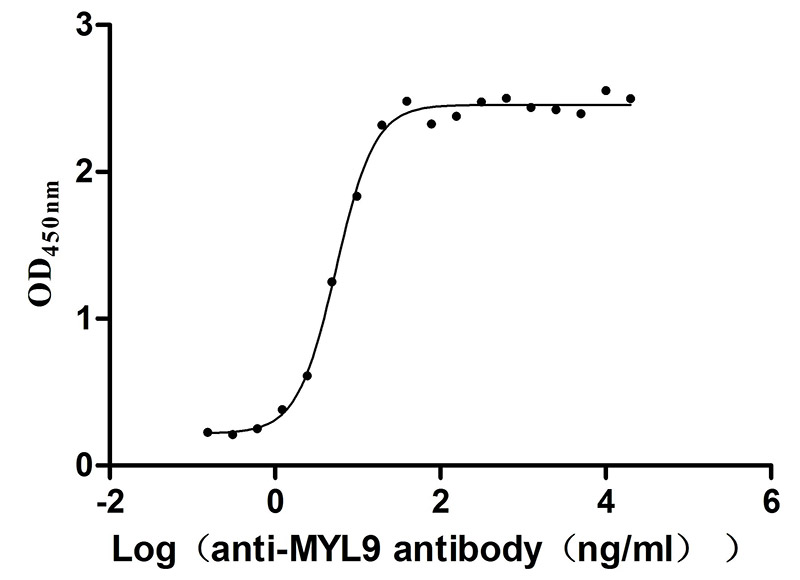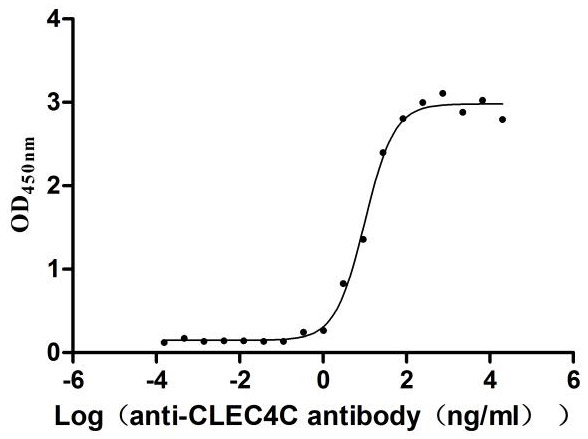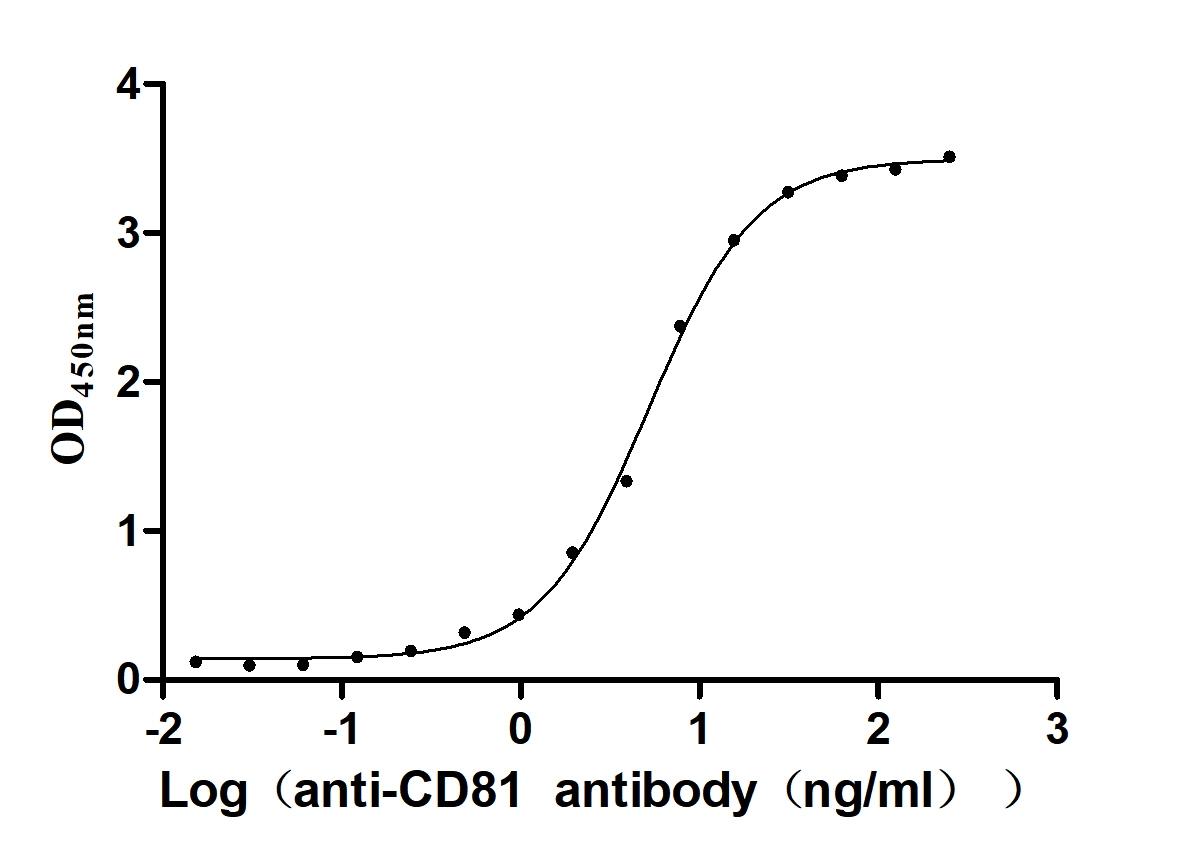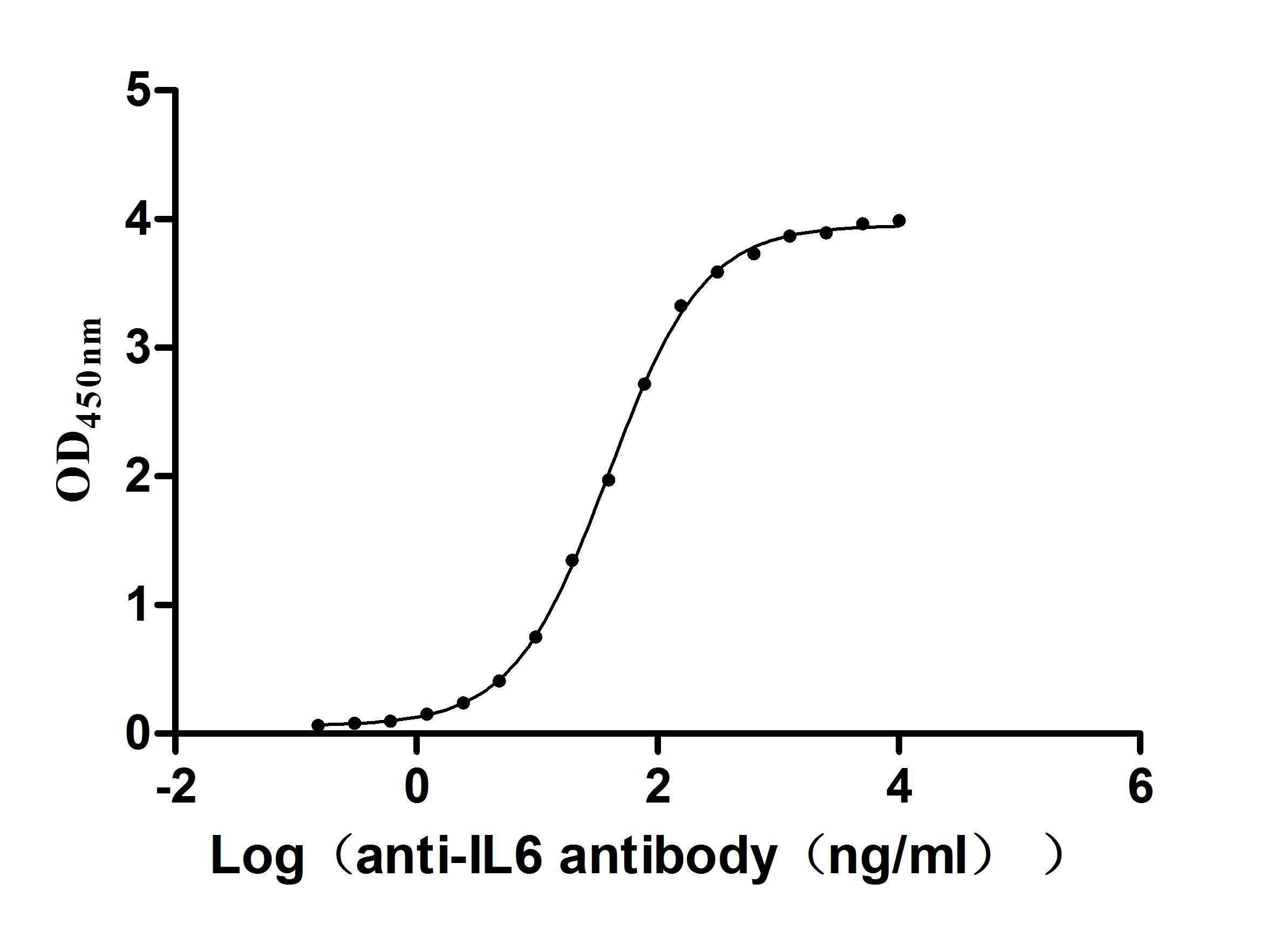Recombinant Mouse Beta-2-microglobulin (B2m)
-
货号:CSB-YP002486MO
-
规格:
-
来源:Yeast
-
其他:
-
货号:CSB-EP002486MO
-
规格:
-
来源:E.coli
-
其他:
-
货号:CSB-EP002486MO-B
-
规格:
-
来源:E.coli
-
共轭:Avi-tag Biotinylated
E. coli biotin ligase (BirA) is highly specific in covalently attaching biotin to the 15 amino acid AviTag peptide. This recombinant protein was biotinylated in vivo by AviTag-BirA technology, which method is BriA catalyzes amide linkage between the biotin and the specific lysine of the AviTag.
-
其他:
-
货号:CSB-BP002486MO
-
规格:
-
来源:Baculovirus
-
其他:
-
货号:CSB-MP002486MO
-
规格:
-
来源:Mammalian cell
-
其他:
产品详情
-
纯度:>85% (SDS-PAGE)
-
基因名:
-
Uniprot No.:
-
别名:B2mBeta-2-microglobulin
-
种属:Mus musculus (Mouse)
-
蛋白长度:Full length protein
-
表达区域:21-119
-
氨基酸序列IQKTPQIQVY SRHPPENGKP NILNCYVTQF HPPHIEIQML KNGKKIPKVE MSDMSFSKDW SFYILAHTEF TPTETDTYAC RVKHASMAEP KTVYWDRDM
-
蛋白标签:Tag type will be determined during the manufacturing process.
The tag type will be determined during production process. If you have specified tag type, please tell us and we will develop the specified tag preferentially. -
产品提供形式:Lyophilized powder
Note: We will preferentially ship the format that we have in stock, however, if you have any special requirement for the format, please remark your requirement when placing the order, we will prepare according to your demand. -
复溶:We recommend that this vial be briefly centrifuged prior to opening to bring the contents to the bottom. Please reconstitute protein in deionized sterile water to a concentration of 0.1-1.0 mg/mL.We recommend to add 5-50% of glycerol (final concentration) and aliquot for long-term storage at -20℃/-80℃. Our default final concentration of glycerol is 50%. Customers could use it as reference.
-
储存条件:Store at -20°C/-80°C upon receipt, aliquoting is necessary for mutiple use. Avoid repeated freeze-thaw cycles.
-
保质期:The shelf life is related to many factors, storage state, buffer ingredients, storage temperature and the stability of the protein itself.
Generally, the shelf life of liquid form is 6 months at -20°C/-80°C. The shelf life of lyophilized form is 12 months at -20°C/-80°C. -
货期:Delivery time may differ from different purchasing way or location, please kindly consult your local distributors for specific delivery time.Note: All of our proteins are default shipped with normal blue ice packs, if you request to ship with dry ice, please communicate with us in advance and extra fees will be charged.
-
注意事项:Repeated freezing and thawing is not recommended. Store working aliquots at 4°C for up to one week.
-
Datasheet :Please contact us to get it.
相关产品
靶点详情
-
功能:Component of the class I major histocompatibility complex (MHC). Involved in the presentation of peptide antigens to the immune system.
-
基因功能参考文献:
- When no programmed delay interval was imposed, the beta2m-deficient mice acquired the task as fast as controls, suggesting that discrimination of left and right positions is not impaired by the total loss of hippocampal asymmetry. beta2m-deficient mice made fewer correct responses than control mice when variable delay was imposed, suggesting that the asymmetry of hippocampal circuitry plays an important role in working... PMID: 28039089
- The results show that, although other factors influence the fibril growth kinetics, a striking difference in the solubility of the proteins is a key determinant of the different amyloidogenicity of human B2M and mouse B2M. PMID: 26780548
- Use of shRNA against beta-2-microglobulin offers a simple and effective approach to minimize immunogenicity of the main cellular components of cardiac tissue constructs in non-syngeneic recipients. PMID: 25775354
- systemic B2M accumulation in aging blood promotes age-related cognitive dysfunction and impairs neurogenesis PMID: 26147761
- Because all forms of H-2K(b) are internalized but little beta2m-receptive heavy chain is present at the cell surface, it is likely that beta2m dissociation and recognition of the heavy chain for lysosomal degradation take place in an endocytic compartment. PMID: 25782992
- We report a novel dichotomous role of beta2m and CD1d, whereby these molecules differently regulate autoimmunity against phospholipid versus non-phospholipid autoantigens. PMID: 23531237
- The goal of the present work was to study peculiarities in functioning of proteasomes and associated signaling pathways along with evaluation of NeuN and gFAP expression in different sections of the brain in mice. PMID: 24237146
- MHC I and b2m genes are both expressed in in human as well as mice during the developmental stages of cerebellar cortex PMID: 24272393
- Knocking out beta 2 microglobulin abolishes NMDAR-dependent LTD in area CA1 of adult mouse hippocampus and is accompanied by memory deficits. MHC class I expression could be an unexpected cause of disrupted synaptic plasticity and cognitive deficits. PMID: 23959708
- This study demonistrated that Deletion of beta-2-microglobulin ameliorates spinal cord lesion load and promotes recovery of brainstem NAA levels in a murine model of multiple sclerosis PMID: 22335434
- Data show that tapasin expression is enhanced by beta 2-microglobulin via both transcriptional and post-transcriptional mechanisms. PMID: 23089196
- This gene is known to be important for immune responses and may potentially regulate alcohol consumption. PMID: 21309947
- Data show that NK subsets bearing Ly49s, which bind "self-MHC" were found to be the dominant subset responsible for beta2m(-/-) BMC rejection. PMID: 22184406
- Skin graft rejection induced by B2m-derived minor transplantation antigens involves Th2-dependent eosinophilic rejection, IFN-gamma dependent mechanisms, and Fas-Fas ligand interactions. PMID: 12077281
- beta-2 microglobulin knockout-anti-asialoGM1 mice exhibit improved hemodynamics and cardiac contractile function after cecal ligation and puncture that may account, in part, for survival benefit PMID: 14630624
- Rag1 deficiency in Hfe knock-out mice leads to heightened iron overload, mainly in the liver, whereas the heart and pancreas are relatively spared compared with beta2mRag1(-/-) mice. PMID: 14656877
- Beta 2 microglobulin deficient mice react normally to endotoxin and their hepatocytes react normally to IL-6. PMID: 15192150
- Results show that a seven-residue segment of human beta2-microglobulin (beta2M), not found in mouse beta2M, is sufficient to convert beta2M to the amyloid state, and that specific residue interactions are crucial to the conversion. PMID: 15249659
- Knockout mice represent an instructive model of spontaneous iron overload resembling genetic hemochromatosis. PMID: 15315790
- Experimental autoimmune encephalomyelitis in beta 2-microglobulin(beta2m)-deficient mice is significantly more severe, with a 10-fold increased mortality in beta2m-null mice as compared to wild-type C57BL/6 mice. PMID: 15837577
- The results suggested that beta2m as well as TAP was necessary for the transportation of blastocyst MHC from endoplasmic reticulum to cell surfaces through the Golgi apparatus, similar to other MHC class I molecules. PMID: 15896332
- thermodynamic stabilities of the beta2m variants PMID: 16229893
- Data provide a crystallographic comparison of H-2D(b) in complex with gp33 peptide and either human or mouse beta(2)microglobulin. PMID: 16375919
- acquisition of an impaired breeding phenotype (IBP) as a result of the knockout of beta-2 microglobulin (B2M) directly implicates B2M in the reproductive cycle of mice PMID: 17442853
- voluntary wheel running exercise-induced liver beta2-microglobulin expression is related to lower IgG clearance in the blood PMID: 17524613
- macrophages have a role in the formation and degradation of beta2-microglobulin amyloid fibrils PMID: 17686767
- Alterations in beta 2-microglobulin influence the ability of T cell receptors to engage class-I histocompatibility antigen H-2Kb during normal T cell physiology. PMID: 17785793
- beta 2m-associated effect other than FcRn prolongs the survival of both IgG and albumin PMID: 18375831
- Data show that cerebella from adult mice deficient for H2-D1 and H2-K1, and for beta2-microglobulin gene are of deficient elimination of supernumerary climbing fiber synapses on their Purkinje cells. PMID: 18418877
- A natural killer T (NKT) cell subset is restricted by a beta-2 microglobulin-independent form of CD1d antigen and may induce bronchial hyperreactivity. PMID: 18802058
- these studies clearly indicate the importance of a beta(2)-microglobulin-dependent but CD8 T-cell- and iNK T-cell-independent mechanism critical for survival during K. pneumoniae bacteremia. PMID: 18981251
- the mechanism by which beta(2)-microglobulin negatively regulates gammadelta T cell homeostasis remains to be determined PMID: 19201842
- results indicate that beta(2)m may be involved in proliferation of uNK cells in the metrial gland, and that beta(2)m may affect the maturation of uNK cells in the decidua basalis. PMID: 19262044
- NKT cells modulate plasmid DNA vaccine antigen expression and vaccine-elicited immune responses by MCP-1 secretion after interaction with a beta2-microglobulin-independent CD1d PMID: 19833737
显示更多
收起更多
-
亚细胞定位:Secreted.
-
蛋白家族:Beta-2-microglobulin family
-
数据库链接:
KEGG: mmu:12010
STRING: 10090.ENSMUSP00000099534
UniGene: Mm.163
Most popular with customers
-
Recombinant Human Leukocyte surface antigen CD47 (CD47), partial (Active)
Express system: Mammalian cell
Species: Homo sapiens (Human)
-
Recombinant Human Tumor necrosis factor ligand superfamily member 8 (TNFSF8), partial (Active)
Express system: Mammalian cell
Species: Homo sapiens (Human)
-
Recombinant Human Glucagon receptor (GCGR), partial (Active)
Express system: Mammalian cell
Species: Homo sapiens (Human)
-
Recombinant Human Claudin-18.2 (CLDN18.2)-VLPs (Active)
Express system: Mammalian cell
Species: Homo sapiens (Human)
-
Recombinant Human Myosin regulatory light polypeptide 9 (MYL9) (Active)
Express system: Yeast
Species: Homo sapiens (Human)
-
Recombinant Human C-type lectin domain family 4 member C (CLEC4C), partial (Active)
Express system: Mammalian cell
Species: Homo sapiens (Human)
-
Recombinant Human CD81 antigen (CD81), partial (Active)
Express system: Mammalian cell
Species: Homo sapiens (Human)
-


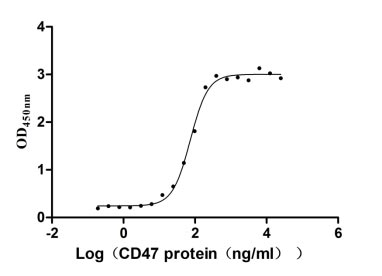
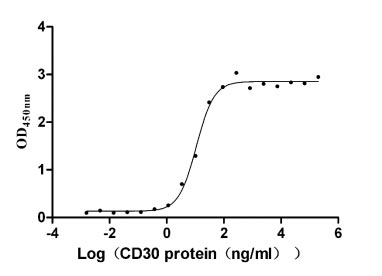

-AC1.jpg)
